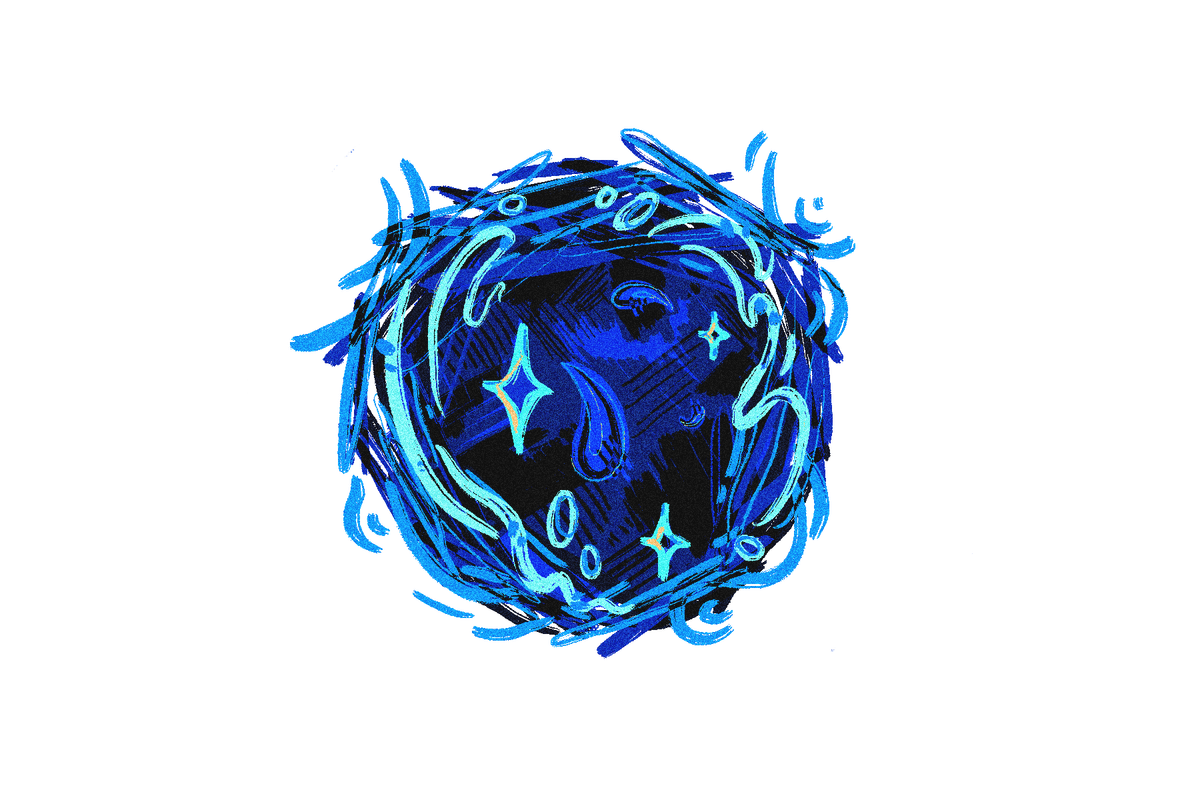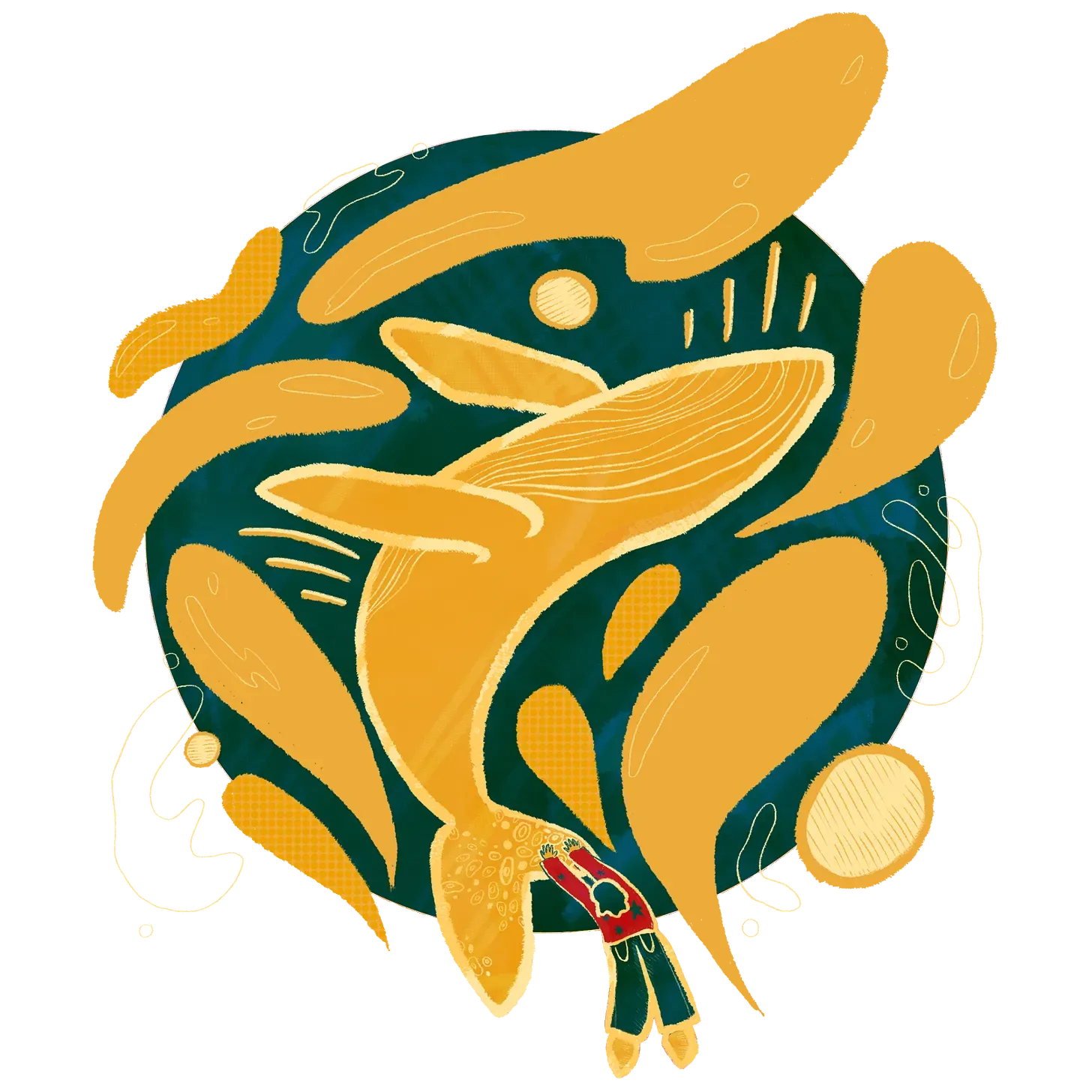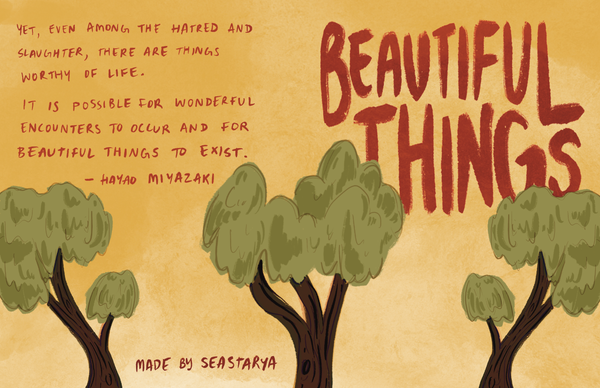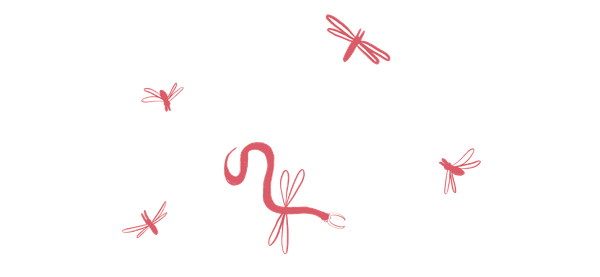do robins cry?
an essay by Sarah Stoeckl

This submission is for the “Nature Loved & Lost” issue of Filter Feeder and will additionally be highlighted in a print zine (coming April 2025). If you’d like to share your work via Filter Feeder in the future, drop me a line!

My Day 1
I notice her one morning, looking out my living room window, coffee in hand — a robin sitting on a nest and her partner stopping by to check in. She and her partner chose a skinny tree, with two high up branches jutting out side-by-side, in which to construct their egg haven. It sits at eye-height outside my window. I am enamored.
Day 2
I check in on them the next day and look up “nesting robins” online. I learn that female robins lay one egg a day because it takes a lot of energy to bloop out each one. The mother will usually refrain from sitting on them until she has a full clutch so that all the babies hatch at roughly the same time. Like other birds, she will have a “brood patch” on her belly, a place where she loses her feathers during the breeding season so she can put her open skin directly onto the eggs to keep them warmer. These details charm me. I am in awe of what mothers can do. It should take the babies about two weeks to hatch, although I have no idea when they actually started nesting.
Day 3 (for me)
It’s the next day, actually, that I notice momma gone, only to return to a riot of gasping maws popping above the nest’s edge begging for food. I count five? no, four? no, three hatchlings. I begin referring to them as the “greedy little goblins” due to their frantic clammerings whenever mom or dad flies up with worms for their never-satisfied mouths. The babies look like tiny monsters, beaks too big, feathers sparse and akimbo.
The babies should be in the nest for just under two weeks before they fledge. Two weeks, I think, less than, to watch this mini-story unfold. I want more, so I dig my partner’s binoculars out from the closet — inherited from his father, metallic-cool and heavy, missing one protective lens cover and having long since lost any kind of strap. Pressed against my face, I see even more detail, such as momma’s mottling of brown and gray feathers, the babies’ scrawny heads, and the moss the robins used to line their nest. I recall hearing Robin Wall Kimmerer, an ecologist and botanist with particular expertise in mosses, on a podcast saying that moss provides both softness and anti-bacterial properties and think, Good job, robins!
Day 6
I grow more curious about the female. I notice how her breast is less vibrant than her partner’s, more dusty orange than his dusky red. She seems to have more body mass than he does, spreading herself out over the nest to cover the babies when the rain starts up, as it often does during this very wet spring. This task becomes harder and harder as the hatchlings grow and grow. I spy her poking and tucking them down, an occasional mini beak or eye peeking out. I imagine her saying or at least thinking, with the exasperation of all mothers, “Stop it. Be quiet. Settle down, now.”
A month, give or take. That’s how much time a robin spends laying, sitting, and tending her children. Even with doing this process each year, sometimes more than once each spring, this seems like an amazing deal of motherhood, far better than humans get. I imagine her both loving her children, acquiescing to the instinct to breed and sit and feed, and then also dreaming of what she will do once they fly away. I envision her not as a sad empty-nester but, rather, looking forward to brunch with her girlfriends, soaring from tree to tree, being responsible for no mouth and belly but her own. What a marvelous deal it seems, a season of motherhood and then back to blissful freedom.
Day 8
The babies grow. Their adult feathers start coming in, but it takes a few days for them to replace their baby pin feathers, leaving them looking like tiny were-birds, caught in slow transformation. They look as awkward and in-between as all tweens, I suppose.
One morning looking through the binoculars, I see momma stuff food down the goblins’ throats and then in mere seconds one baby lifts up its backside and mom receives a small white something and flies away with it. What did I just see?!?
When my partner awakes, bleary-eyed with morning sleep, I can barely restrain myself telling him that the babies poop out a “fecal sack” within seconds of eating that the parents then take away so they don’t foul the nest. Gross and funny and ingenious. I cannot help imagining all those hatchling diaper bombs dropping everywhere all spring.
Day 11
The babies hatched a week and a half ago. They aren’t really babies now, brown and grey and spotty, so big that momma cannot fully cover them anymore. As they wait for food, ever incessant, one will rise up, reach her/his/their wings, as if testing out their strength and stretch, as if they cannot resist the urge to move their growing bodies. They will fledge soon. I long to see it. I wonder if momma does too.
Day 13
It’s been two days since I’ve seen momma robin. Yesterday, papa brought food and I assumed momma was out hunting and I just missed her. But she is not around today either. I keep checking, particularly as the day drains away, the time when she would always return to sit on the babies and keep them warm. I tell my partner, “I haven’t seen momma. I’m worried about her.” By the third morning I accept that she is gone.
I want to imagine her taking a mini-break, now that the babies are old enough to stretch their wings, a cruise maybe, a girls’ weekend. I even project some “woman on the edge of a nervous breakdown” energy, done with the stress and burden of always feeding perpetually grasping mouths, of protecting such writhing, poking bodies. But I know my anthropomorphizing does not help here. I suspect a cat. Feel a sudden rancor at my neighbors who don’t bell their fluffy terrors. Reflect on cats in general — psychotic killers, them. (I recognize that I extended no such empathy for the deaths of countless worms.)
The family of robins had been like a nature documentary, David Attenborough narrating them as the stars as the stars of the show for whom everything will work out (at least for the duration of the program). This is as opposed to the nature documentary with cats as the star, where the audience screams in bloody delight at the destruction of the birds. But with the disappearance of the mother, the robins transform into a family drama, one weighed down with pathos and hard truths.
Momma robin’s disappearance prompts a feeling in me of crashing through a barrier, as if I’ve been pushed through a pane of glass forcing me back into an awful reality. The spring of the robins was the same spring that the rights of humans with uteruses to control their own bodies wore a noose around its neck, waiting for the black-robed executioners. The death cult of capitalism continued to drive the survivability of life on our planet ever closer to the brink. The same weekend the hatchlings fledged, a white supremacist rotted out with concern over what kind of people get to take up space in the world murdered ten Black Americans in a grocery store. And the following week, an 18-year-old gunman massacred 19 fourth-graders and two teachers mere days before the summer break. Oh, and we were all still sorting out the long tail of a pandemic. I cannot help conflating the mother robin’s death with these other horrors, feeling not as if she won by spreading her genes on but, rather, that she deserved to have her independent summer.
Day 15
One day, the fledglings are gone. I assume like all young things, they managed to find their way out of the nest despite whatever tragedies befell them within its confines. And so papa robin too is gone.
In the wake of the nest’s abandonment, I am left mostly with questions. What emotions are robins capable of? Did the hatchlings, now fledglings, miss their mother as they huddled together through an uncovered night? Did they long for her encouragement as they each took their place on the edge of the nest? Did the male miss his partner? Did he rue the labor of solo feeding those perpetually hungry mouths? What feelings or thoughts flashed through the mother’s mind as she met her end, red in tooth and claw? Did she think of her babies? Did she feel a flash of regret over the loss of her almost-summer? Did she feel nothing but terror and powerlessness in the face of a chaotic world?
They say that doves cry. I do too. Do robins?




